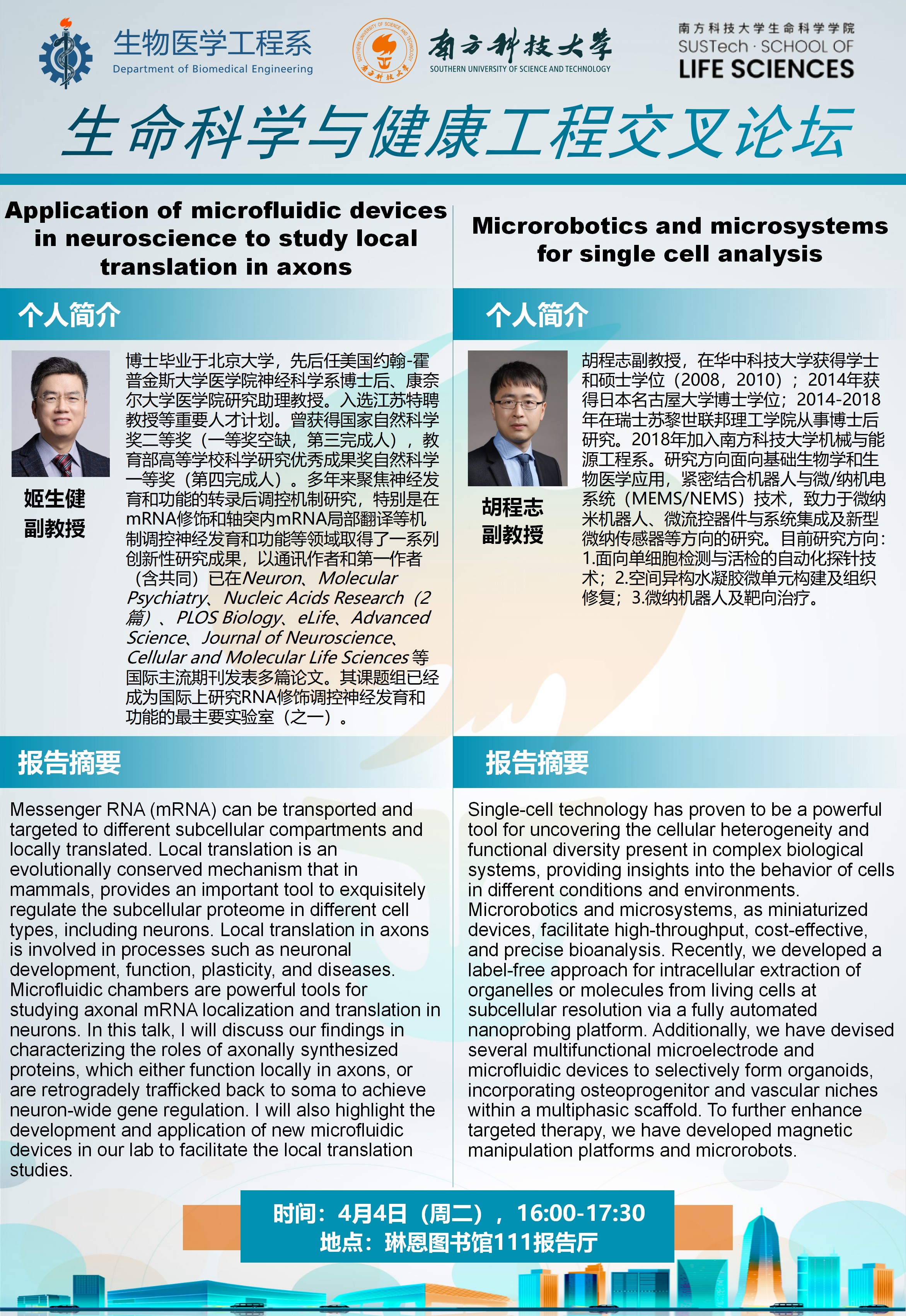
主讲人: 姬生健副教授、胡程志副教授
时间: 4月4日(周二),16:00-17:30
地点: 琳恩图书馆111报告厅
题目:Application of microfluidic devices in neuroscience to study local translation in axons
主讲:姬生健(生命科学学院副教授)
题目:Microrobotics and microsystems for single cell analysis
主讲:胡程志 (机械系副教授)
时间:4月4日(周二),16:00-17:30
地点:琳恩图书馆111报告厅
个人简介:
姬生健博士毕业于北京大学,先后任美国约翰-霍普金斯大学医学院神经科学系博士后、康奈尔大学医学院研究助理教授。入选江苏特聘教授等重要人才计划。曾获得国家自然科学奖二等奖(一等奖空缺,第三完成人),教育部高等学校科学研究优秀成果奖自然科学一等奖(第四完成人)。多年来聚焦神经发育和功能的转录后调控机制研究,特别是在mRNA修饰和轴突内mRNA局部翻译等机制调控神经发育和功能等领域取得了一系列创新性研究成果,以通讯作者和第一作者(含共同)已在Neuron、Molecular Psychiatry、Nucleic Acids Research(2篇)、PLOS Biology、eLife、Advanced Science、Journal of Neuroscience、Cellular and Molecular Life Sciences 等国际主流期刊发表多篇论文。其课题组已经成为国际上研究RNA修饰调控神经发育和功能的最主要实验室(之一)。
胡程志副教授,在华中科技大学获得学士和硕士学位(2008,2010);2014年获得日本名古屋大学博士学位;2014-2018年在瑞士苏黎世联邦理工学院从事博士后研究。2018年加入南方科技大学机械与能源工程系。研究方向面向基础生物学和生物医学应用,紧密结合机器人与微/纳机电系统(MEMS/NEMS)技术,致力于微纳米机器人、微流控器件与系统集成及新型微纳传感器等方向的研究。目前研究方向:1.面向单细胞检测与活检的自动化探针技术;2.空间异构水凝胶微单元构建及组织修复;3.微纳机器人及靶向治疗。
摘要:
Messenger RNA (mRNA) can be transported and targeted to different subcellular compartments and locally translated. Local translation is an evolutionally conserved mechanism that in mammals, provides an important tool to exquisitely regulate the subcellular proteome in different cell types, including neurons. Local translation in axons is involved in processes such as neuronal development, function, plasticity, and diseases. Microfluidic chambers are powerful tools for studying axonal mRNA localization and translation in neurons. In this talk, I will discuss our findings in characterizing the roles of axonally synthesized proteins, which either function locally in axons, or are retrogradely trafficked back to soma to achieve neuron-wide gene regulation. I will also highlight the development and application of new microfluidic devices in our lab to facilitate the local translation studies.
Single-cell technology has proven to be a powerful tool for uncovering the cellular heterogeneity and functional diversity present in complex biological systems, providing insights into the behavior of cells in different conditions and environments. Microrobotics and microsystems, as miniaturized devices, facilitate high-throughput, cost-effective, and precise bioanalysis. Recently, we developed a label-free approach for intracellular extraction of organelles or molecules from living cells at subcellular resolution via a fully automated nanoprobing platform. Additionally, we have devised several multifunctional microelectrode and microfluidic devices to selectively form organoids, incorporating osteoprogenitor and vascular niches within a multiphasic scaffold. To further enhance targeted therapy, we have developed magnetic manipulation platforms and microrobots.